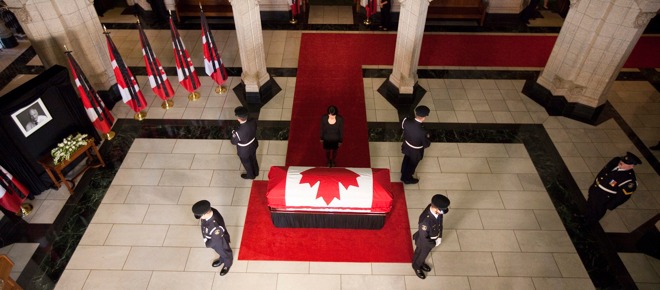The Commons: Mourning Jack
If Layton’s lying-in-state was without precedent, it is now not without justification
Share
 Here lay Jack Layton. Here where he basked in the warm glow of the television lights and held forth each afternoon. Here before the grand door to our grandest room. Here where you can turn your gaze just slightly upward and see the Prime Minister’s office. Here a few flights of stairs below the ornate office that Mr. Layton was to occupy for the next four years. Here between the portraits of Borden and King, surrounded by carved sandstone, underneath a ceiling of decorated glass. Here wrapped in our beautiful flag.
Here lay Jack Layton. Here where he basked in the warm glow of the television lights and held forth each afternoon. Here before the grand door to our grandest room. Here where you can turn your gaze just slightly upward and see the Prime Minister’s office. Here a few flights of stairs below the ornate office that Mr. Layton was to occupy for the next four years. Here between the portraits of Borden and King, surrounded by carved sandstone, underneath a ceiling of decorated glass. Here wrapped in our beautiful flag.
Down the hall and around the rotunda and down another flight of stairs and then outside and along the path that leads to the magnificent Centre Block, a thousand people made their way to his casket. In Toronto, a thousand words written in chalk in a public square. On the lawn of Parliament Hill, probably several thousand millilitres of orange soda mixed in among the flowers and notes and balloons.
This is how we mourn and remember and mark and honour.
Inside the House of Commons foyer, they filed up to where he lay. Four guards stood in dress blues and white gloves, their backs turned and their heads down. Nine Canadian flags stood with black ribbon. To the right, a black and white portrait of Mr. Layton, framed by black curtains.
Some crossed themselves, others bowed their heads as if in prayer or mouthed a few words. There were deep breaths and watery eyes. One woman sobbed, another blew a kiss. People in all manners of dress from however many walks of life. A man on crutches. A woman holding a baby. Children looked overwhelmed. A mother tried to explain the scene to a daughter who clutched a small bouquet of flowers.
Except for the shuffle of feet, the click of heels and the periodic squeak of a door, it was quiet.
This is possibly—depending on which facts of history one chooses to apply—without precedent. Jack Layton was not a prime minister, nor a governor general, nor a cabinet minister. He was not a war hero. He was not a father of confederation. But if it was somehow without precedent, it is now not without justification. Because here they came. Because here they stood and waited to have a few seconds—maybe 10, if they lingered despite prompting from one of the attendants—in front of a flag-draped casket.
This is how we show people they mattered to us. No matter how small the service, no matter how grand and public the ceremony, we go and we take that moment to show ourselves. None of these people necessarily had to be here, but here they were. If there was necessity it was only in that some might’ve felt they needed to be here. They wanted to be here. They wanted those few seconds. No matter how fleeting or distant or indirect their relationship to the man, he mattered to them. He represented something.
How recently would this have seemed astounding? A year ago? Less? Maybe Jack Layton was always a remarkable fellow. But for so long he was, to put this bluntly, an also-ran: the leader of a party that was never going to matter as much. His was the third-most-important campaign plane. He was not going to be prime minister. Someday the numbers might give him a chance to be the kingmaker, but that was about as much as anyone—save, of course, for him and his team—could imagine. And then this spring happened. And suddenly, even if he was the same person, he was something else entirely.
It’s probably true that nothing can truly be appreciated until it’s gone. But he was also ascendent. And maybe that explains what has followed his death. Or maybe it’s those words—”Love is better than anger. Hope is better than fear. Optimism is better than despair.”—and how he seemed to be a face for those ideals. Maybe people just liked him.
In truth, the why doesn’t matter. Because here are all these people. And in Toronto are all those words.
Shortly before four o’clock here, Olivia Chow emerged to greet those waiting outside. Tiny and solitary, dressed all in black, she walked along the barricades, shaking hands and talking and smiling. She stopped to accept a flower from a young woman and was soon consoling a small group in orange Jack Layton buttons.
She greeted a few more mourners and then slipped into the passenger seat of a waiting car. The crowd applauded as she left. People stood and waited, the line running down Parliament Hill, around East Block and out of sight.